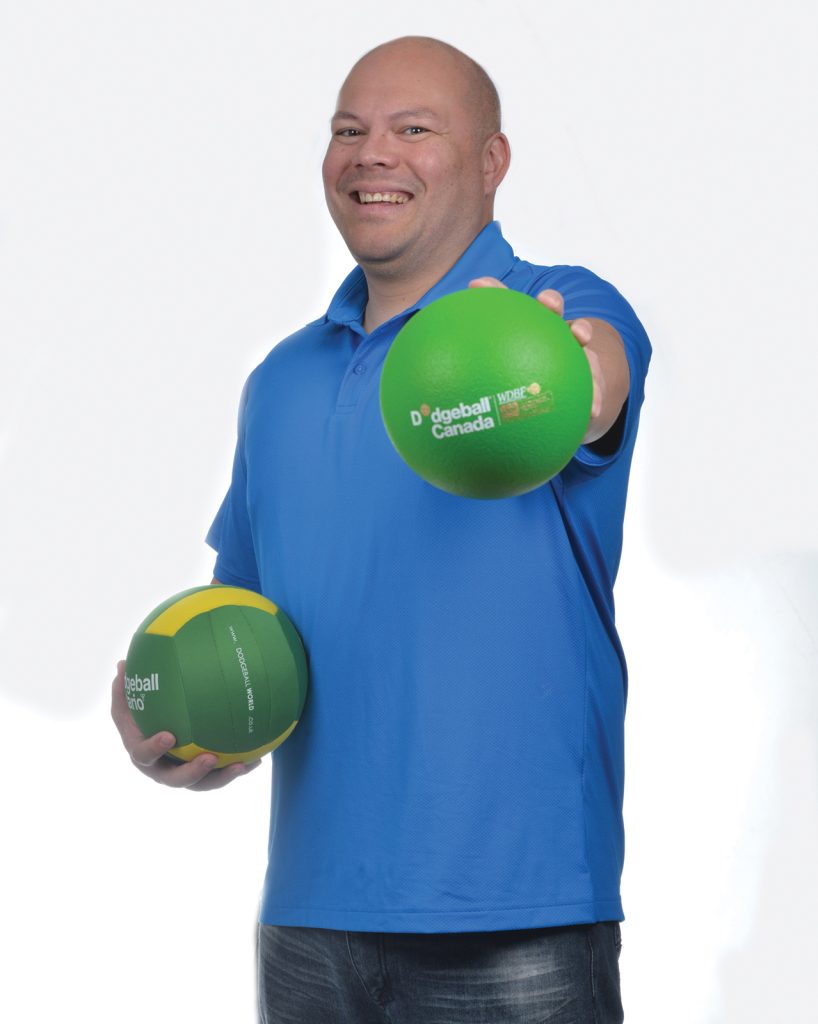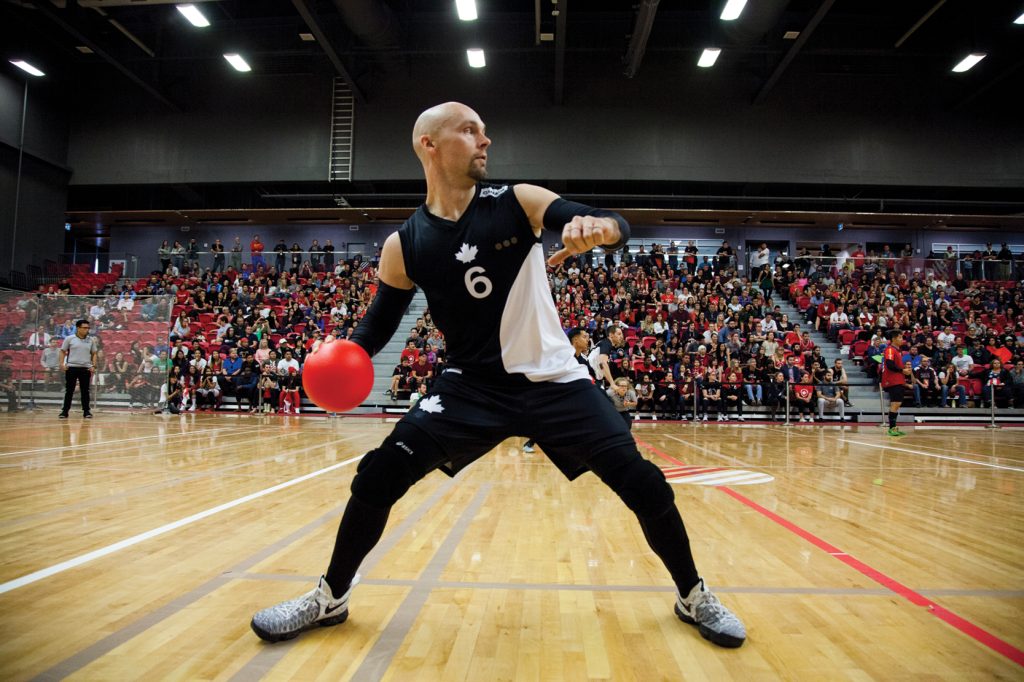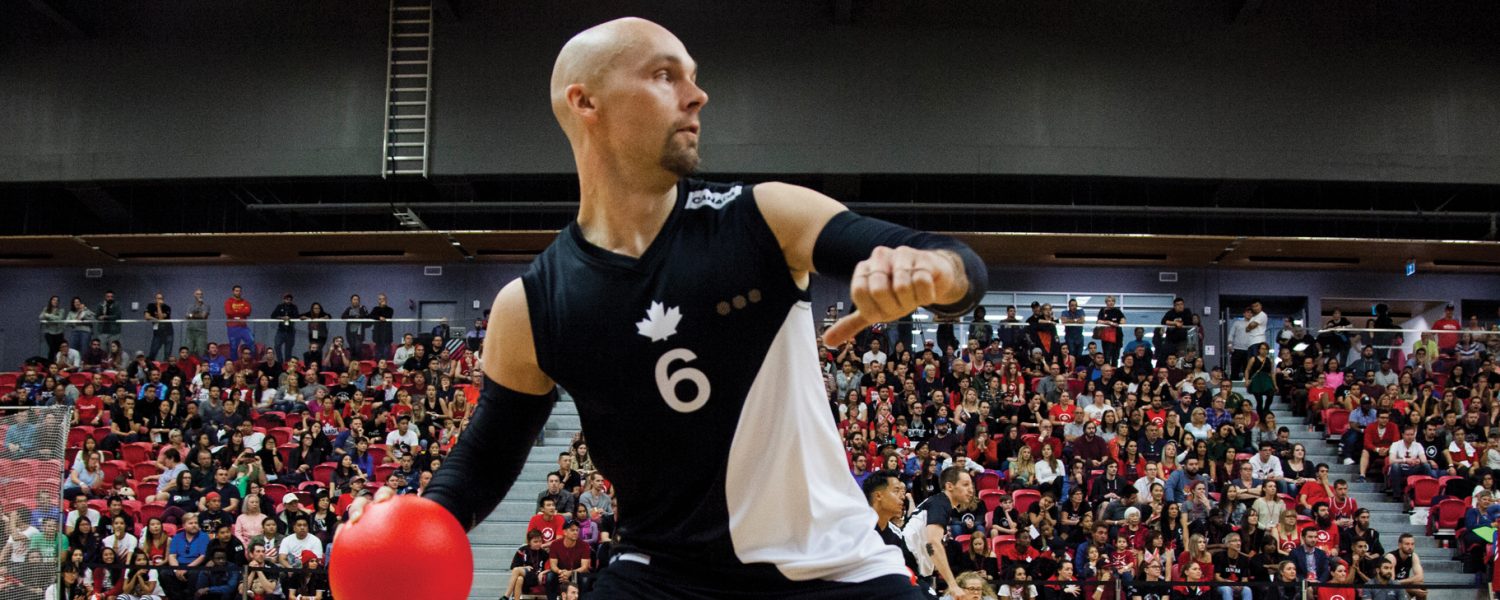Jeremy Renaud Named
General Manager of Dodgeball Canada
Story by Matthew St. Amand
Photography by John Liviero
Dodgeball is a game that is so universal that when life on another planet is finally discovered, it’s a near certainty that we’ll find they also play dodgeball.
Everyone remembers it from gym class and the schoolyard. The game is so brilliantly simple, combining the agility of fencing, the hand-eye coordination of squash, and the sudden-death intensity of musical chairs, but without the malice. Dodgeball has it all.
Dodgeball Canada, the federally incorporated not-for-profit organization that represents thousands of dodgeball players across the country, has just appointed Windsor native, Jeremy Renaud, its new General Manager. Among his many duties, he has direct oversight of Dodgeball Canada’s national teams.
“I was very honoured to be offered this position,” Jeremy says. “Mine is a dual role—operational and team services—leaning more toward management of our six national teams. I manage the coaches, they manage their teams, I hold the coaches accountable to managing athletes, and dealing with infractions.”
He continues: “Currently, in Markham, we’re going through a selection process for people to be on the Team Canada squads. Then, there is the logistics for team travel, food, and compliance.”

There are upwards of 80,000 competitive and recreational dodgeball players in Canada, from Victoria, British Columbia to St. John’s, Newfoundland, and numerous points between. Approximately one million people in thirty-two countries play dodgeball, worldwide.
A once-avid rower, plying his skills in St. Catharines, New Zealand, and the LaSalle Rowing Club, what drew Jeremy to dodgeball?
“First and foremost, it was the unique opportunity to grow a fringe sport,” he says. “I have competed at three sports at a high level, swimming, rowing, and water polo. Dodgeball has the team mentality of rowing, and the solo mentality from swimming. At Dodgeball Canada, I take my experience from more formalized sports and implement policies and procedures to propel the sport forward. The more structures you have at a high level, the more they filter down to provincial level, and then to grass roots.”
To be sure, dodgeball matches are entertaining to watch. The World Dodgeball Federation (WDBF) is divided into two disciplines: foam ball and cloth ball. Teams of six players compete against each other on a dodgeball court, which is thirty feet wide, sixty feet long, divided by various coloured lines, according to WDBF standards.
Aside from the six “attackers,” each team has ball retrievers who collect balls thrown by the opposing side, which have gone out of bounds. The retrievers collect the balls quickly and pass them to attackers on the court. Attackers are not permitted to leave the court unless they are hit and caught out.
The rules of the game are what they’ve always been: those hit by a ball are out, and attackers whose throws are caught are out. Attackers can deflect throws with the ball in their hand. Players who step on, or over, the centre or court boundary lines are out. When a catch is made, that team gets a previously hit-out player back in, up to six attackers maximum per side.
The agility of the teams cannot be overstated. Attackers make expert no-look throws, facing right, then pegging-off someone to their left. Attackers dodge sniper-like throws with surreal ease. During the men’s foam bronze playoff of the 2014 Dodgeball World Championship match between Hong Kong and Malaysia, an attacker from Hong Kong made a blinding throw at a Malaysian player. The Malaysian player dove but could not avoid being hit. The play, however, did not end there. The ball that struck the Malaysian player ricocheted off his body into the air. A nearby teammate ran after the ball and spiked it to another teammate, who dropped the ball he had in his hands, and caught the spiked ball. The result: the Hong Kong attacker was out, to the ecstatic cheers of an enthralled audience.

As an avid sportsman during high school and university, Jeremy pivoted into sports management afterward. He came to dodgeball pretty much by happenstance.
“I’ve always been involved with the sports community,” Jeremy says. “A friend of my family had moved to Toronto and gotten involved in dodgeball—playing, but also in an administrative capacity with Dodgeball Ontario. At one point, she contacted me, and said: ‘Do you know anyone who could help at a national level?’ Dodgeball Canada needed someone with the type of experience I had.”
Jeremy connected with the president of Dodgeball Canada and applied for the GM role within the burgeoning organization.
“Working with a developing sport,” Jeremy notes, “I can already see changes. Most other sports are already formalized, and it can be a long process to implement changes. With dodgeball, we see the results of decisions more quickly. The sport is still coming into its own.”
Human interaction—particularly in the context of sports—is always a complicated affair. Not everyone is in love with dodgeball. Critics have dubbed it “organized bullying.” Starting in 2001, American school districts began banning dodgeball. Larry Alex Taunton, a defender of dodgeball, wrote a 2019 Op-Ed for USA Today. In it, he stated that dodgeball is about teaching hard life lessons. It’s about winning.
That, perhaps, is what brings the drama and excitement to the game, particularly when it is played at an elite level.
For his own part, Jeremy’s work with Dodgeball Canada fulfills a life-long ambition. He reflects: “One of my dreams, growing up in sports, is I wanted to work at the Olympic level. When Team Canada travels, the Team Canada administrative lead, Chef de Mission, goes as well.”
That title translates to “head of mission,” and in a sports context, it refers to the person leading a national delegation, including athletes, coaches, and other behind-the-scenes team members who form the Mission Team.
“My position is logistically the same job as Chef de Mission,” Jeremy says.
Aside from General Manager of Dodgeball Canada, Jeremy is a Professor of Sport and Recreation Management at St. Clair College, the Esports Coordinator at the University of Windsor, and General Manager for Canada’s National Sports Card & Memorabilia Expo. In his spare time, he volunteers in the local area sports community through to the MLSE Foundation.
To learn more about Dodgeball Canada, visit www.dodgeballcanada.org.




Add comment